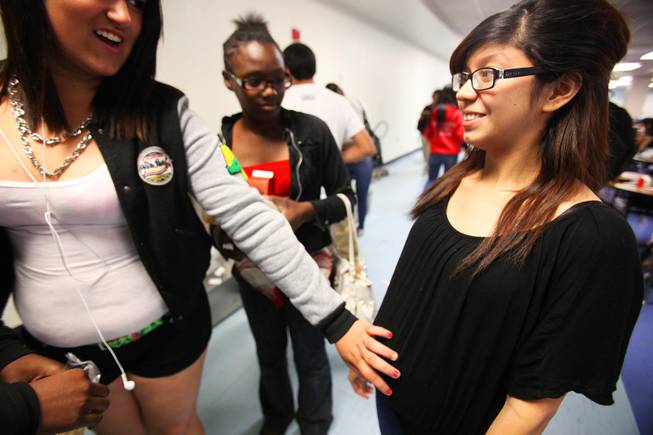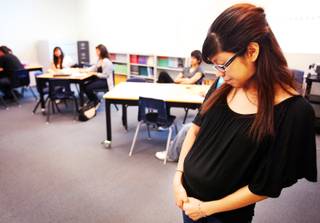
Evaleen Diaz, 18, at Western High School on Thursday, April 26, 2012. Diaz, a senior at Western, is seven months pregnant.
Sunday, May 13, 2012 | 2 a.m.
What is a turnaround school?
The Clark County School District implemented the "turnaround" model at five of its worst-performing schools for the 2011-2012 school year. Four of these schools — Chaparral, Mojave and Western high schools, and Hancock Elementary School — received a piece of a three-year, $8.7 million federal School Improvement Grant to improve test scores and for the high schools, graduation rates. As part of the turnaround model, the principal and at least half of the staff were replaced at each school, and schools were required to implement new programs and teaching methods to improve student achievement.
Evaleen Diaz plods up three flights of stairs at Western High School as rushing students course around her. At the top, the 18-year-old lets out a huge sigh. It is still early in the morning, but Diaz is spent. She’s pregnant.
The news came as a surprise to her in December, when she was preparing for her last chance to pass the Nevada High School Proficiency Exam, a necessary step in earning her diploma. And if she’s going to provide the kind of life she wants for her daughter, Isabella, she needs that diploma.
“I really want to graduate,” Diaz says. “I don’t want her to think later in life, ‘My mom didn’t graduate, why should I?’ ”
Although she is on track with her class credits, Diaz has two proficiencies — science and writing — that she still must pass. But her study time is interrupted by weekly doctor’s appointments, preparations for her baby and family responsibilities.
Even if she worked hard, passed her exams and became eligible to graduate, Diaz still might not make it across the stage to receive her diploma. That’s because Isabella is due June 21, the day after Western’s graduation ceremony. Research has shown premature births are common in teenage pregnancies.
But Diaz says her baby’s birth won’t stop her from clutching her diploma.
“If I can graduate and pass my tests, I’m going to walk, no matter what,” she says hopefully. “Even if she’s coming out of me, I’m going to walk.”
Video
•••
Shock. Disbelief. Panic.
That’s what Diaz felt as she stared down at her 10 pregnancy tests, all of them positive.
Diaz feared her family would forsake her.
“I was scared to tell my parents,” she says. “I didn’t know what to do.”
Diaz tried to hide her pregnancy for as long as she could.
She had her cover stories. I just ate a big meal. I’m getting fat. My dress makes me look that way.
But as her midsection grew, Diaz’s explanations no longer worked. She confided in her cousin, who encouraged her to come clean. If something happened to the baby, Diaz could never live with herself, her cousin said.
So, Diaz broke the news to her aunt, who passed it along to Diaz’s parents. The fallout almost tore the family apart.
Diaz’s father refused to look at her. Her mother was so furious, she wouldn’t speak to her for days.
“I am sorry, but I can’t do nothing about it,” Diaz told her mother, who also was in her teens when Diaz was born.
“You broke my heart,” her mother told her. “You should have thought about what you were doing.”
Abortion was out of the question for the devoutly Christian family, who live in a single-story house where a crucifix and a photo of Jesus adorn the walls. Adoption was also ruled out. Although Isabella was unplanned, she is still family, Diaz’s father said adamantly.
Eventually, her parents warmed to the idea of becoming grandparents and began helping their daughter. They took her to doctors, paid her medical bills and began preparing, once again, for a baby in the house.
They contacted Isabella’s father, a 25-year-old local high school graduate who blamed the pregnancy on Diaz. The man threatened to take her to court if she tried to force him to pay child support, Diaz says.
“He’s not going to be there for my daughter, so I don’t consider him her father,” Diaz says, tears welling up. “I feel sad sometimes because my daughter is going to need a father.”
•••
There is one week left until the last proficiency exams of the year, and it’s crunch time at Western. The turnaround high school has been conducting proficiency test prep during class, after school and even on Saturdays to help students prepare.
The last time she took the science test, Diaz came close to passing.
Her science teacher begins reviewing key vocabulary terms for the test one recent morning.
“Which one of these show radioactive decay?” the teacher asks the class as she points to several graphs on the projector screen. “Do you know what we use carbon-14 for?”
Diaz tries hard to concentrate in the dimly lit classroom. But there are plenty of distractions.
Morning sickness. Pregnancy cravings (Chinese food and bacon). Isabella kicking. Frequent bathroom breaks.
And then, there’s the issue of navigating the three-story, multiple-building campus at Western.
“It’s hard. My classes are up and down, up and down,” Diaz says. “I’m always hungry, too. I always want to eat.”
Western administrators have made accommodations for her, allowing her to eat snacks in class and take the school elevator. But because Diaz has hemophilia — a genetic disorder that prevents blood from clotting — her doctors have advised her to walk around campus as much as she can to improve circulation and strengthen internal joints and muscles.
Diaz’s blood disorder — coupled with her young age — makes for a high-risk pregnancy, according to her doctors. That’s why a hematologist is also monitoring her pregnancy.
“I’m kind of scared because they tell me I can over-bleed,” Diaz says, adding a Caesarean section is out of the question.
Having to see three doctors — the hematologist, an obstetrician and a separate gynecologist — creates its own complication: lots of appointments.
Because both of her parents — casino employees who work the night shift — can only take Diaz to her doctors’ appointments during the day, Diaz says she is forced to choose her baby’s health over her education.
“It’s hard because I miss school and my grades go down,” she says.
Here, too, Western administrators have been accommodating, excusing Diaz’s excessive absences — as long as there’s a doctor’s note — and ensuring that she keeps up with her classwork at home.
Diaz says studying at home is not the same as learning in the classroom. The fact that she has to take care of her two younger brothers — ages 11 and 9 — in the evenings while her parents work further diverts her attention from schoolwork.
“It’s hard because I learn with teachers,” Diaz says. “(At home) I sit there and look at the paper. I don’t know what to do.”
•••
Research shows teenage mothers are more likely to drop out of high school. To help at-risk students like Diaz beat the odds, Western sought the help of community mentors who could offer guidance, encouragement and regular check-ins to see how students are doing.
One of Diaz’s mentors, Daniel Topete, is a graduate advocate counselor who was brought to Western with funding from the United Way of Southern Nevada. Topete helps oversee the mentoring program, which helps a handful of pregnant teenagers in Western’s senior class.
Topete has been meeting regularly with Diaz to ensure she stays on track to graduate,. Foremost on Topete’s mind are Diaz’s proficiency exams.
“Are you planning to come to Saturday school?” Topete asks a few days before the test.
“If I wake up, I’ll go,” Diaz replies.
“No, you are going to go,” Topete says sternly. “I know you’re extra tired because of your baby, but this is your last chance. You need to do whatever it takes.”
Diaz is lucky, Topete says, because she has her family’s support. Her father drives her to school, her mother takes her to doctor’s appointments, and her 19-year-old sister helps out, too. After Isabella is born, Diaz says her family will help take care of her baby, especially if she attends college.
“I’m always worried how much support they’re getting at home,” Topete says of his pregnant students, some of whom have been kicked out of their homes. “Some girls don’t have that complete support network.”
Even if a pregnant student has a solid foundation at home, high schools can be a caustic environment for them with the gossiping, name-calling and alienation.
Some students have written Diaz off as a “nobody” now that she’s pregnant, she says. One boy called her a “whore.” He was disciplined.
“I don’t care what people say,” Diaz says, shrugging. “It hurts me sometimes and it makes me really sad. … I don’t know why they say stuff like that if they don’t know what I’m going through.
“I’m having my daughter, no matter what people say. They’re not going to change my mind.”
•••
Diaz dreams of going to College of Southern Nevada and becoming a physical therapist. One of her younger brothers was in a car accident, and physical therapy proved invaluable in his recovery, she says.
But first and foremost, Diaz says she wants to be a good mother to Isabella. The happiest moment since she found out she was pregnant in December was seeing her daughter for the first time on the screen of an ultrasound machine, she says.
“It made me tear up,” she says. “I feel like every mom when they go get their ultrasound, they get really emotional, like, ‘Oh my God, it’s growing inside of me.’ ”
Despite being 18 and pregnant, Diaz says she doesn’t feel like an adult quite yet.
Growing up quickly is hard, she says.
“I feel like I didn’t have enough fun yet,” she says. “I’ve never been to a club, and I can’t go now because I have a daughter. I can’t go to the senior trip because I’m pregnant. ... I can’t go out with my family because I get really tired sometimes.”
But she always comes back to this: “I don’t regret my daughter, even if she wasn’t planned. It happened for a reason.”
Ruby, Diaz’s sister and a Western graduate, says she might know why.
“Before, my sister didn’t care about school,” Ruby says. “But now, she has to get a better job to support her baby. She understands that she has to do everything she can to graduate.”
Diaz agrees.
“I have to grow up,” she says. “I am going to have a baby, and she’s going to need me, and I’m going to have to show her I’m here for her.”


